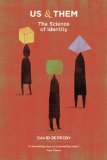Summary | Excerpt | Reviews | Beyond the Book | Readalikes | Genres & Themes | Author Bio

Critics' Opinion:
Readers' Opinion:
First Published:
Oct 2005, 384 pages
Paperback:
Oct 2008, 396 pages
 Book Reviewed by:
Book Reviewed by:
BookBrowse Review Team
Buy This Book
The important point is that any of these alternatives is possible.
Mindless facts - who is a Tutsi, who is a Hutu, who has a veil, who
lacks one - cannot predict what people will do. Human beings are
unusually alike, compared to most species. We're also, each of us,
unique. From those two facts, it follows that measurable, objective
differences will always exist between any two groupings of people, and
that any two groups, no matter how different, will be the same on many
other measures. It will always be possible to find differences between
this race and that one, this nation and those, people with this gene
versus people without it. But not one of those facts will tell why you
divided people into the human kinds you chose to analyze.
People who look at the traits of the kinds themselves, then, are
posing the wrong questions. Do American Jews have higher average scores
on certain academic tests than other Americans? Do African American
marrieds have sex more often than others? Are Hispanics more likely to
attend church? Maybe so, maybe not; but people don't start with data and
then divide the world into Jews, African Americans, and Hispanics. It's
the other way around. First we believe in those human kinds, and then,
because we believe, we gather the data. To understand this aspect of
ourselves, we don't need any more facts about human kinds. We need facts
about human minds.
One way to find those facts is to study human kinds as if they were
rules for thinking - methods of sorting out perceptions. You see a woman
caring for her child and class her as a mother; you see a white-haired,
stooped man and class him as an old person. That's a psychologist's
approach. On the other hand, sociologists and anthropologists have
looked at human kinds as rules for behavior - methods of knowing what
people are supposed to do. In the right circumstances, knowing that
someone is in the navy, or a doctor, or a devout Christian, tells you
what he's likely to do, and how you should act in your turn. That
knowledge serves as a bulwark against the force of ever-changing
circumstances. Feeling hurried or stressed makes people less likely to
help another person, but a reminder of their duties as members of a
human kind can make them turn back. A military uniform, a Hippocratic
oath, a bracelet that asks Christians "what would Jesus do?" -
such tokens of membership make our actions more consistent than they
would otherwise be. They remind us to look beyond the emotions of right
here, right now, and act as members should. The navy is supposed to
defend the nation, doctors to heal the sick, Christians to be Christlike,
no matter what.
So these human kinds offer the joy of belonging to something larger
than the little self; they let us thrill to a feeling of existence
across centuries and continents, of being alive so long as
"we," our kind, endure. The first type of human kind is a
category based on traits ("white hair equals old person," for
example). The second type is based on obligations ("Soldiers must
serve the nation"). An institution of this second sort, we sense,
must act consistently, even if individual members fail it. That's what
defines human kinds of this second type: the things people do to belong.
That consistency makes it easy to think of this sort of human kind as
if it were a person itself - a being with thoughts, plans, and feelings
of its own. Nations have moods, schools have spirits, and a congregation
can repent. You can say the navy has decided to seek more recruits next
year. It's harder to come up with a sentence about how the world's
mothers have decided to act.
Copyright © 2005 by David Berreby. No part of this book maybe reproduced without written permission from the publisher.





The Flower Sisters
by Michelle Collins Anderson
From the new Fannie Flagg of the Ozarks, a richly-woven story of family, forgiveness, and reinvention.

The House on Biscayne Bay
by Chanel Cleeton
As death stalks a gothic mansion in Miami, the lives of two women intertwine as the past and present collide.

The Funeral Cryer by Wenyan Lu
Debut novelist Wenyan Lu brings us this witty yet profound story about one woman's midlife reawakening in contemporary rural China.
Your guide toexceptional books
BookBrowse seeks out and recommends the best in contemporary fiction and nonfiction—books that not only engage and entertain but also deepen our understanding of ourselves and the world around us.